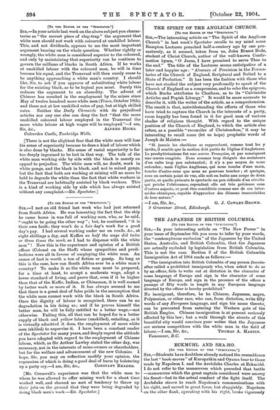SIR,—I met an old friend last week who had just
returned from South Africa. He was lamenting the fact that the ship he came home in was full of working men, who, as he said, "ought to be going the other way " ; but, he continued, "it is their own fault; they won't do a fair day's work for a good day's pay. I had several working under me on roads, &c., at eight shillings a day, and Kaffirs on half the wage did twice or three times the work, so I had to dispense with the white men" ! Now this is the experience and opinion of a British officer (Colonel on the Staff) whose sympathies and predi- lections were all in favour of employing the white man. An ounce of fact is worth a ton of fiction or gossip. So long as this is the case, how can South Africa ever be a white man's country? To make it so the white man must be prepared, for a time at least, to accept a moderate wage, adopt a lower standard of living, and prove that, even if it be higher than that of the Kaffir, Indian, or Chinaman, it is well earned by better work or more of it. It has always seemed to me that there is a great deal of false pride in the assumption that the white man cannot work with the black in South Africa. Once the dignity of labour is recognised, there can be no degradation in his doing so ; and if he proves himself the better man, he will be fully entitled to a better wage,—not otherwise. Failing this, all that can be hoped for is a better supply of black and yellow labour (unskilled), entailing, as it is virtually admitted it does, the employment of more white men (skilled) to supervise it. I have been a constant reader of the Spectator for many years, and deeply regret the attitude you have adopted with regard to the employment of Chinese labour, which, as Sir Arthur Lawley stated the other day, was necessary, not in the interests of mine-owners or shareholders, but for the welfare and advancement of the new Colonies. I hope, Sir, you may on reflection modify your opinion, the expression of which is doing a good deal of harm by bolstering up a party cry.—I am, Sir, &c., CONSTANT READER.
[Mr. Cresswell's experience was that the white men to whom he was allowed to offer mining work for a short time worked well, and showed no sort of tendency to throw up their jobs on the ground that they were being degraded by doing black men's work.—ED. Spectator.]










































 Previous page
Previous page